Tag: 2018 Olympics
Plenty of Standouts at Olympics
by The Cowl Editor on March 1, 2018
Professional Sports
Despite Low Medal Total, Plenty of Highlights for the US.
by Joe Myko ’19
Sports Staff
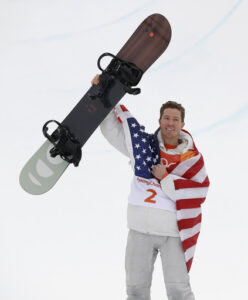
The XXIII Winter Olympic Games was recently held in PyeongChang, South Korea, with the opening ceremony taking place on Feb. 9 followed by 16 jam-packed days full of various winter sports. The closing ceremonies wrapped the games up on Feb. 25.
There were 102 events offered for spectators, ranging over seven sports and 15 different disciplines–including: bobsleigh, snowboarding, figure skating, ice hockey, and various variations of skiing.
Norway impressively concluded the games with the most medals (39), with Germany (31) and Canada (29) finishing 2nd and 3rd in the medal rankings. The United States (23), Netherlands (20), and Sweden (14) had the next highest.
The United States medal breakdown saw them take home Nine gold, Eight silver, and Six bronze medals. Shaun White’s gold medal for the Men’s Snowboard Halfpipe was one of the more memorable moments of the tournament for the US. Not only was he able to secure his third Olympic gold medal, his victory was also the 100th gold medal for the U.S. in the Winter Olympic history.
The Women’s Ice Hockey Team also deserves congratulations for taking home the gold in a memorable 3-2 win against Canada. The win marks the U.S. women’s hockey team first gold medal in 20 years. The women came second in the last two Olympics behind Canada.
The United States’ Men’s Curling Team, comprised of skip John Shuster and a team of Matt Hamilton, Tyler George and John Landsteiner, put on an impressive performance in PyeongChang – securing five back-to-back wins after a shaky start, before finally toppling highest-ranked team Sweden to bring home the country’s second medal in curling and first in gold within the sport.
Despite performing in precarious conditions which pushed back the schedule of two events, Mikaela Shiffrin secured a gold medal for the United States in the women’s alpine skiing giant slalom. Shiffrin took home the second Olympic gold medal of her career, tying Ted Ligety and Andrea Mead Lawrence for most gold medals in U.S. alpine skiing history.
The Olympic Athletes from Russia (OAR) provided an impressive final to the Men’s Ice Hockey event, coming back from 3-2 down to Germany to achieve a 4-3 win in overtime after having tied 3-3 with a short-handed goal with less than a minute left on the clock. This provided Russian athletes with their first gold medal in the event since 1992, when they still competed as the Unified Team.
The Canadian duo of Scott Moir and Tessa Virtue performed a breathtaking ice dancing routine to the soundtrack of Moulin Rouge, providing a memorable event which secured them their third Olympic gold medal and fifth medal overall.
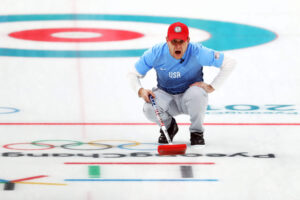
The Nigerian Women’s Bobsled Team provided one of the most memorable and highly-anticipated stories of the tournament, becoming Africa’s first ever Olympic bobsledders. The women were also Nigeria’s second participants at the games in South Korea following Skeleton driver Simidele Adeagbo’s debut for her country. Adeagboo gave an admirable performance within the competition considering she is only six months into competing in the sport on a worldwide scale.
Despite finishing last (115th) in the 15-Kilometer Cross-Country Skiing event, Mexican athlete German Madrazo provided one of the most iconic and memorable moments of the tournament; proudly picking up and waving his country’s flag from the side as he approached the homestretch.
Almost 3,000 athletes took part in the Olympics, competing for a total of 92 nations in all. Six nations also made their Winter Olympic Games debut: Ecuador, Eritrea, Kosovo, Malaysia, Nigeria, and Singapore.
The 2018 Winter Olympic Games logo represented two hangul letters, from the Korean alphabet, which make up the initial sounds of PyeongChang. The first of these symbols is also said to be the Korean philosophical triad of humanity, earth and heaven, whilst the second symbol is a crystal of ice. The games had two official mascots, an Asian black bear called Bandabi and a white tiger called Soohorang.
The next installment of the Winter Olympics is set to take place in Beijing, China, in 2022, with the opening ceremony scheduled for Feb. 4.
End Games in Overtime, Not Shootouts
by The Cowl Editor on March 1, 2018
Professional Sports
No Need to End Big Games in a Shootout
by Meaghan Cahill ’20
Sports Co-editor
On the anniversary of the 1980 Olympics’ “Miracle on Ice,” the United States Women’s Hockey Team made history of their own by winning their first Gold Medal in 20 years. The team achieved victory in a dramatic shootout on Feb. 22, beating rival Canada 3-2. And while the women’s team played phenomenally in all of their games in PyeongChang, their win brings up the much debated argument on shootouts.
There is no denying that shootouts, especially in hockey, can be extremely entertaining to watch. However, despite the entertainment factor, shootouts should not be a determining factor on which team gets to win the game, especially in a game as big as a gold medal game.
During regular season games shootouts are not much of a problem because not much is at stake. Yet, for a gold medal game to be decided by what is essentially a coin flip, that is just not okay. In the National Hockey League, all playoff games are played out until there is a game-winning goal scored, no matter how many over-time periods it takes. That should not be any different for the Olympics.
That is not to take away from the Americans’ win, because it was a remarkable feat all around that was very exciting to watch. However, choosing to end the game with a shootout because it was getting to be too long was not fair to either team. They should have been allowed the opportunity to play until t
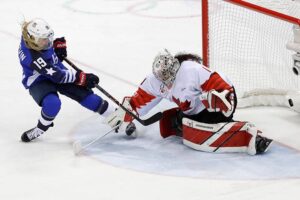
he very end because up until that point, those athletes had given everything to come that far in the games, and to let it end like that was not fair to them.
Three sports currently use shootouts as a final determination for who wins the game: soccer, ice hockey, and field hockey. The biggest problem with shootouts is that they do not fairly represent the 60+ minutes played by both teams. There is no denying that teams are giving everything they have in games that go over the standard 60 minutes of hockey and still be tied. Team effort and perseverance drives the entire game and for that game to be decided in a shootout diminishes those aspects of it.
Shootouts come down to a single player and a goalie and there can only be two outcomes: either the puck goes into the net or it is saved. There is really no play involved and it is nothing more than a trivial way to end a game, especially in games of high importance. It denies players the opportunity to contribute to their team win, because ultimately, it is a single player that gets to be the hero of the game.
In conclusion, shootouts should not be used to determine an outcome of a game that so heavily involves team effort. Shootouts ultimately rest on the luck of a single player and in the case of high stakes games such as the Olympics, it does not provide a satisfying ending worthy enough of the two teams fighting for the win.
Let the Games Begin!
by The Cowl Editor on February 8, 2018
Professional Sports
What to Watch for from Opening to Closing Ceremonies
by Jack Belanger ’21
Sports Co-Editor
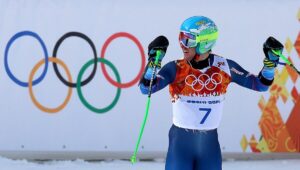
This week will mark the beginning of the 2018 Winter Olympics, with the official opening ceremonies set for Feb. 9 at 6 a.m. Eastern Standard Time. There has already been plenty of controversy even before any of the athletes boarded their planes for PyeongChang, South Korea.
In December it was announced that Russia was banned for one of the biggest doping scandals in history. On Jan. 17, North and South Korea came to an agreement where their athletes will walk under one unified flag and combine to have one women’s hockey team for the two countries.
This is not the first time North and South Korea have walked together, having joined forces for the opening ceremonies for the 2006 Turin Olympics. What makes the decision controversial has to do with the escalating tensions between the United States and North Korea over the past year due to North Korea’s heightened nuclear missile program and the U.S. sanctions on them.
While the joint hockey team shows that there may be signs of dialogue and peace between North and South Korea, North Korea has yet to show any signs of slowing down missile tests. Vice President Mike Pence is expected to attend the opening ceremonies, and according to a Washington Post report, he is going to bring the father of the late Otto Warmbier, an American student, who was jailed in North Korea in 2016, where he fell into a coma which eventually led to his death in June 2017. It is rumored that Warmbier’s coma was potentially caused by brain-damaging torture inflicted in the North Korean prison.
Despite some of the controversy, there are plenty of reasons to look forward to the games this year. Like most games, U.S. athletes are favored to win multiple events. Here are some of the names and events to look for if you want to see that red, white, and blue on the podium:
Ted Ligety, Alpine Skiing: Ligety, 33, is entering his fourth Olympics and is looking for his third gold medal after securing his second in Sochi for giant slalom. Ligety is known as one of the greatest American alpine skiers in history, as he has seven gold medals between the Olympics and World Championships. He is trying to make a comeback after missing most of the 2017 season with a back injury.
Women’s Alpine Skiing: The U.S. has two of the top skiers in the world in Lindsey Vonn and Mikaela Shiffrin. Vonn, considered one of the greatest women’s skiers, won two medals in 2010 in Vancouver before missing the 2014 games. Shiffrin, at only 22, already has four gold medals between the Olympics and the World Championships. She is also in first place for women for the 2018 season according to the International Ski Federation. According to Sport Illustrated’s Brian Cazeneuve, either Shiffrin or Vonn is favored to win gold in four of the five alpine events.
Men’s Ice Hockey: For the first time since 1994, the Olympics will not see any current NHL players compete for the gold. The NHL barred its players from competing Olympics has interfered with their schedule in past years. This year’s U.S. team will feature a mix of minor league players with NHL experience, college players, and some Americans playing overseas. Current Boston University forward Jordan Greenway is one of four college players on the team. While it may take another miracle for U.S. to take the gold, expect the team to play hard for a chance to win a medal.
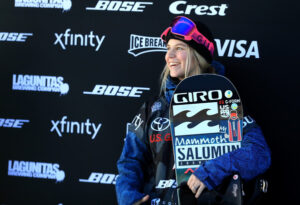
Men’s and Women’s Snowboarding: If you are a fan of snowboarding, you are in luck as the U.S. should be well represented on the podium in the various snowboarding events. On the men’s side, Shaun White returns for his fourth Olympics, looking for his third Olympic gold medal in the halfpipe and a return to the podium after a fourth-place finish in Sochi. Chris Corning and Red Gerard, both making their Olympic debuts, are looking to make the podiums in the Big Air and Slopestyle events. On the women’s side, 17-year-old Chloe Kim is looking to grab a medal in the halfpipe in her first Olympic appearance. This event could see a U.S. sweep as five-time Olympian Kelly Clark and newcomer Maddie Mastro could also make the podium.
Things to watch for:
If you miss the opening ceremonies in the morning, you are in luck. NBC will show the ceremonies again on primetime at 8:30 p.m. (EST) on Feb. 9.
There will be 12 gold medals handed out this weekend. Some of the events to catch include: Men’s ski jumping at 7:35 a.m. and men’s snowboarding slopestyle at 8 p.m. on Saturday, February 10, and the women’s snowboarding slopestyle at 8 p.m. and men’s 5000 meter in speed skating at 3 p.m. on Sunday. Be sure to check your TV schedules as NBC has plenty events airing throughout the day.
Olympic Committee says “No More Russia”
by The Cowl Editor on December 7, 2017
Professional Sports
IOC Bans Russia for Doping Scandal
by Jack Belanger ’21
Sports Co-Editor
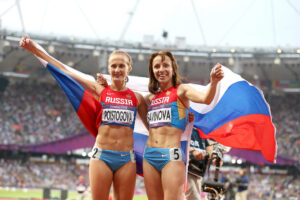
On Tuesday, December 5, the International Olympic Committee (IOC) voted to ban Russia from competing in the 2018 Winter Olympic Games in Pyeongchang, South Korea for state-wide doping, which Russian officials were believed to cover up. Over 25 Russians from the 2014 Sochi games have been disqualified and banned from the games.
This decision marks the full-fledged ban of Russia from any Olympic Games after reports came out of a Russian state-sponsored doping cover-up after the 2014 games in Sochi. It was determined that Russia’s sport ministry tampered with over 100 urine samples to conceal steroid use by many top athletes. The Russian track and field team was banned from the 2016 games in Rio de Janeiro, but Russian athletes were allowed as the IOC decided to allow committee from individual sports to determine banning Russian athletes.
IOC President Thomas Bach concluded, “This was an unprecedented attack on the integrity of the Olympic Games and sport. The IOC EB, after following due process, has issued proportional sanctions for this systemic manipulation while protecting the clean athletes. This should draw a line under this damaging episode and serve as a catalyst for a more effective anti-doping system led by WADA.”
Olympic officials have left the door open for some Russian athletes to compete in the games as a neutral athlete under the Olympic flag. Athletes who have shown they have gone through rigorous drug testing will be able to petition to be allowed to compete. Regardless of how many athletes do this, Russia’s athlete count will be nowhere close to past competitions.
It is also certainly possible Russia has its athletes who could be allowed to compete boycott the Olympics all together. From an ABC news article, Russia’s current sports minister Pavel Kolobov said having its athletes under a neutral flag would be “unacceptable” but the final decision would be made by President Vladamir Putin, who has denied any state involvement in the scandal.
Rumors of cheating began to surface in 2014, when German network ARD reported a documentary that there was systematic doping in Russia. This caused the World Anti-Doping Agency (WADA) to launch its own investigation.
It released their findings in November 2015, in which they found out that “state-sponsored” doping occurred. WADA also suspended the Russian Anti-Doping Agency (RUSADA), and recommended Russia be banned from the 2016 Rio games.
In May of 2016, Russian official were dealt a huge blow, when the former head of Russia’s anti-doping labatory, Grigory Rodchenkov, who fled from Russia to the U.S., revealed to the New York Times detail of Russia’s organized doping. He described the involvement of the Sports Ministry and the Federal Security Service (FSB) in Russia and said at least 15 medalists from Sochi were involved.
On July 18, 2016 Professor Richard McClaren, who previously looked into Rodchenkov’s allegations, released a report for the WADA that outlined Russia’s state-sponsored doping at the Sochi games. He reported that it was likely that Russia’s Sports Ministry and FSB were involved in covering-up the athletes. WADA responded by declaring RUSADA non-compliant and recommended Russia be banned from the Rio games.
278 athletes were cleared to participate in the Rio games while 111 were banned. After the games, McClaren released a second part to his reports and found that over 1,000 competitors were involved in concealing positive drug tests from 2011-2015.
The IOC has since banned and dissqualified over 20 athletes from the Sochi games, which dropped Russia’s medal count from 33 to 22.
Anti-Doping agencies from around the world called for Russia to be banned from the games, which led to the IOC’s decision. In order for Russia to avoid further punishment, its anti-doping agency must become compliant again.
According to CNN, WADA laid out a plan for RUSADA to become compliant again, but it failed to meet two of the conditions before the IOC made its decision.
2018 Olympics Preview
by The Cowl Editor on November 9, 2017
Professional Sports
By Sam Scanlon ’19
Sports Staff
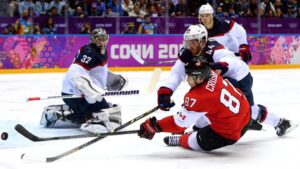
Winter is coming. This winter will be a particularly exciting one, as all eyes will be on Pyeongchang, South Korea. The world’s best winter athletes will convene to represent their respective countries in the 2018 Winter Olympics with some big changes coming to the games this year.
Perhaps the biggest story surrounding this year’s winter games is the absence of the National Hockey League (NHL) players in the ice hockey event. The NHL announced earlier this year that it would prohibit its players from participating in the upcoming Olympics. The reasons were clear and understandable. NHL organizations are no longer interested in shutting down the season for a few weeks just so their players can go play for someone else.
Mid-February is the time of year where the NHL gets its most attention from viewers. The National Football League would have just culminated with the Super Bowl, and Major League Baseball would be in the middle of its off season, so the opportunity to grab new viewers is easiest at this time.
Another reason that NHL organizations are not having their players play somewhere else in the middle of the season is due the threat of injury. NHL players who participate in the Olympics are often times the most valuable and best players on their respective NHL rosters and cannot risk any injuries.
After five consecutive Winter Olympic Games with NHL involvement, the league and organizations decided that it is not worth it to send their players to the Olympics. So, they will look to draw players from the American Hockey League (AHL): the minor league affiliate for the NHL, the Kontinental Hockey League (KHL): Russia’s premiere league, the National
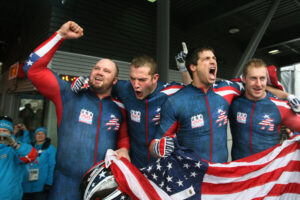
Collegiate Athletic Association (NCAA), and other European professional leagues. Team USA’s roster is going to look a lot like the 1980 “Miracle on Ice” team with its college and other non-NHL players.
While ice hockey is gaining most of the attention now, other sports are going to start to get more focus as they are starting to think about finalizing rosters. The return of Lindsay Vonn is highly anticipated in the ski events. Vonn, who missed the 2014 Sochi Olympics due to a severe knee injury, has worked her way back to the top of the skiing world. Arguably the most famous and successful female skier in the world, her return is going to be vital for the success of Team USA in the alpine skiing events as she is no stranger to the podium; most notably, her gold medal performance in 2010 in the downhill event. In addition to downhill, Vonn also competes in the super-G, slalom, and super combined, where she has had tremendous success the past few years leading up to this Olympics.
Skiing has added a few new and exciting events in recent history, including the freestyle event. Team USA has multiple hopeful participants who are looking to stand atop the podium in February. Gus Kenworthy, who you may recognize from MTV’s “The Challenge: Champs vs. Pros”, is an electrifying freestyle skier who took home the silver medal in the 2014 games. He is someone to watch during this year’s Olympics. Freestyle skiing is something the United States dominates on the men’s side, as Joss Christensenn won gold and Nicholas Goepper completed the USA podium sweep in 2014 with a bronze medal. Look for USA to have extreme success in this event this winter as well.
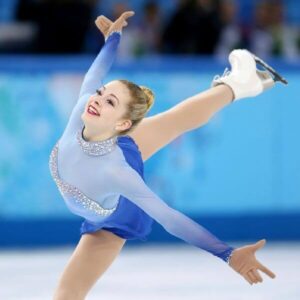
Figure skating has always been a popular Winter Olympic event. Recently, Russia has dominated this event, but Team USA is looking toward young star Gracie Gold to win gold this winter and possibly avoid a Russian sweep. She helped Team USA capture a bronze medal in 2014 in the “Mixed Team” event.
Team USA had a disappointing showing in the snowboarding events in Sochi, but with gold medalist Jamie Anderson leading the charge, they look to get back to the podium this time around in Pyeongchang. In addition to snowboarding, Team USA’s bobsleigh and skeleton athletes will more than likely boost our medal count.
The United States’ top competition throughout this Olympics with be Russia in figure skating and hockey, Austria in alpine skiing, Sweden in cross country skiing, and the Netherlands in speed skating. Team USA has an estimated athlete count of 245, giving them a great chance to medal in each event.
